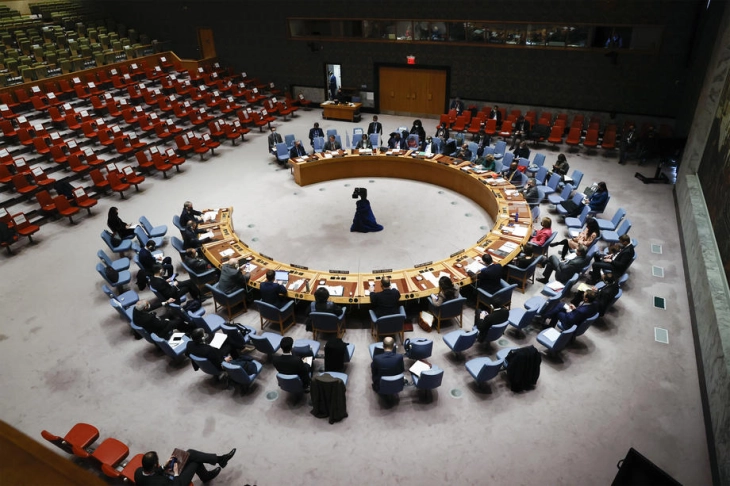Kremlin scoffs at West's rejection of Ukrainian 'dirty bomb' claim

Kiev/Berlin, 25 October 2022 (dpa/MIA) - The West's dismissal of Moscow's claim that Ukraine is planning to use a "dirty bomb" on the battlefield does not mean that there is no such threat, Russian presidential spokesman Dmitry Peskov said on Monday.
"Their distrust towards the information that was shared by the Russian side does not mean that the threat such a 'dirty bomb' may be used ceases to exist - the threat is obvious," Peskov said.
Russia has called a UN Security Council meeting over the matter, according to diplomatic sources in New York on Monday.
A debate is to take place behind closed doors following a meeting on the conflict in Syria on Tuesday, the sources said.
Countries including the United States, Britain and France rejected claims made by Russian Defence Minister Sergei Shoigu last week that Kiev was planning to use a conventional bomb to spread radioactive material.
NATO rejects "Russia's false claim that Ukraine is preparing to use a dirty bomb on its own territory," alliance Secretary General Jens Stoltenberg tweeted on Monday.
"Russia must not use it as a pretext for escalation," Stoltenberg said after a call with United States Secretary of Defence Lloyd Austin and British Defence Minister Ben Wallace.
The European Union's "support to Ukraine continues unabated, including in countering disinformation," top EU diplomat Josep Borrell said on Twitter, criticizing the allegations.
Meanwhile Washington also said there was no evidence that Russia was planning to drop a dirty bomb, either.
"We continue to see nothing in the way of preparations by the Russian side for the use of nuclear weapons, nothing with respect to the potential use for a dirty bomb at this point," National Security Council Communications Director John Kirby said.
"We have seen in the past that the Russians have, on occasion, blamed others for things that they were planning to do," he warned, though noting there was no evidence to suggest this was the case in the present situation. "But it is a play that we have seen before."
Kirby said there was absolutely no truth to the Russian claim that Ukraine was planning to detonate a dirty bomb and then blame it on Russia. "It's simply not true. We know it isn't true," Kirby said.
Also on Monday, Ukrainian military intelligence authorities said they do not expect Russian troops to withdraw from the occupied city of Kherson in southern Ukraine.
On the contrary, the Russian army is preparing to defend the city, the head of the intelligence service, Kyrylo Budanov, said in Kiev on Monday.
"The Russian occupiers are giving the illusion that they are leaving Kherson, but in fact they are deploying new military units there," he told the portal Ukrainska Pravda.
Budanov's statements could not be independently verified, nor could those of the Russian side on the situation in Kherson.
Ukrainian President Volodymyr Zelensky, meanwhile, said that Russia was failing in its invasion of Ukraine on a large scale.
"Ukraine is breaking the so-called second strongest army in the world," Zelensky said in his daily video address on Monday evening, marking eight months since the war began on February 24.
"The feeling of defeat in Russia is getting stronger," Zelensky said, adding that while the country had once been an important political actor, today Moscow was increasingly isolated internationally.
Zelensky emphasized that Ukrainian forces continued to recapture occupied territory every day.
The entire country, including the Crimean Peninsula - annexed by Russia in 2014 - would be freed, he said, while also warning citizens that the winter ahead would be "the hardest in our history" due the damages inflicted upon Ukraine's energy infrastructure by Russian attacks.
British intelligence said earlier on Monday that Ukraine was having increasing success in defending itself against Russian attacks with Iranian drones.
The drones are slow, noisy and deployed at low altitudes, making them "easy to target using conventional air defences," the Defence Ministry wrote on Twitter on Monday in its daily briefing on the war.
Officials in Ukraine have said that up to 85% of the attacks had been intercepted, the ministry said.
Moscow is seen to be using more and more such "kamikaze" drones as its long-range precision weapons become increasingly scare, London said.
The daily updates from intelligence sources, which have been published by Britain since the start of the Russian invasion in February, are disregarded by the Kremlin as propaganda.
On the ground, a wave of long-range missile and drone attacks over the past two weeks has taken a major toll on Ukraine's critical infrastructure like power stations, leaving hundreds of thousands of people in the dark over the weekend.







